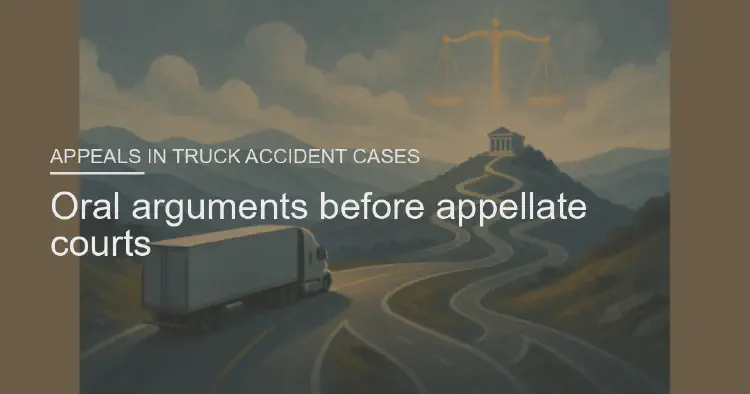Oral arguments before appellate courts
After appellate briefs are submitted, courts may schedule oral arguments. This stage gives attorneys the opportunity to clarify points, answer judges’ questions, and reinforce their strongest legal arguments.
- Truck Accident Law Team
- 2 min read
Article 3 of 6 in Appeals in Truck Accident Cases/

Oral Arguments Before Appellate Courts in Truck Accident Cases
Purpose
- Allow appellate judges to probe deeper into the issues raised in briefs.
- Provide attorneys a chance to emphasize key arguments and respond to judicial concerns.
- Help clarify complex points involving trucking regulations, liability, or damages.
Format
- Typically short—often 15–30 minutes per side.
- Judges may interrupt at any time with questions.
- Attorneys must focus on the most compelling legal issues, not repeat the entire brief.
Role of Attorneys
- Highlight trial errors that justify reversal or modification of the verdict.
- Respond directly and persuasively to judges’ concerns.
- Use case law, statutes, and trial record references to support arguments.
- Avoid overreliance on emotional appeals—focus remains on legal reasoning.
Judges’ Role
- Actively question both sides to test the strength of their legal positions.
- May explore hypothetical scenarios to assess broader implications of a ruling.
- Often form preliminary opinions before oral argument but remain open to persuasion.
Strategic Importance
- Oral arguments can shift judicial perspectives, especially when briefs are evenly balanced.
- Attorneys must be prepared for rapid-fire questioning and stay flexible.
- Performance may influence not only the outcome but also the scope of the court’s written opinion.
Limitations
- No new evidence is introduced—arguments must stay within the trial record and briefs.
- Some appeals are decided without oral arguments if judges deem them unnecessary.
Summary: Oral arguments before appellate courts provide attorneys a final chance to persuade judges by clarifying legal issues and responding to questions. In truck accident cases, this step can be pivotal in determining whether the trial court’s decision is upheld, modified, or reversed.
You might also like:
- Tags:
- Trucking Regulations
- Trial Court
- Case Law
- Liability Damages
- Appellate Courts
- Trial Errors
- Appellate Judges
- Cases Purpose
- Legal Issues
- Oral Arguments
- Court Decision
- Law Statutes
- Trial Court Decision
- Case Law Statutes
- Appellate Courts Truck
- Courts Truck Accident
- Highlight Trial Errors
- Accident Cases Step